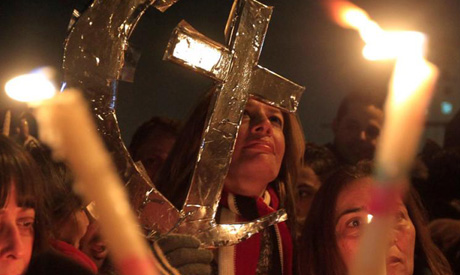 As the drafting committee entrusted with creating Egypt's new constitution, which is to be put to a national referendum next month, races against time to conclude its final product, concern runs high in most rights quarters about what the expected bill would bear for civil, political and other liberties.
As the drafting committee entrusted with creating Egypt's new constitution, which is to be put to a national referendum next month, races against time to conclude its final product, concern runs high in most rights quarters about what the expected bill would bear for civil, political and other liberties.
Despite the active engagement of the Coptic church in the committee, representing the vast majority of Egyptian Christians, serious concerns remain in numerous Coptic quarters about the new bill's ability to attend to the grave citizenship issues that have plagued them in past decades – not least of which those added during the Muslim Brotherhood's one-year rule and its now suspended 2013 constitution, on whose drafting committee the liberal forces and representatives of the Coptic church had walked out.
"We are concerned, and for a very simple reason: in its entirety, the text of the proposed constitution – as we have been able to figure out depending on the access we have to the committee's work – is not at all successful in eliminating the key causes for compromised citizenship rights that Copts, and Christians in general, have been facing," said Coptic activist Marceiliano Youssef, a member of the Maspero Youth Union and the Egyptian Centre for Human Rights.
To attract the attention of the writers of the new constitution, Youssef, with the help of other activists from the Coptic and larger rights community, initiated the move to collect citizens' signatures on a set of demands that should be incorporated "one way or another in the final text offered for referendum."
"We have a campaign titled 'Scream'. Yes, it is inspired by the 'Rebel' campaign, the collected signatures of which were fundamental to the removal of Muslim Brotherhood president [Mohamed Morsi]," Youssef said.
He added that the demands enlisted on the 'Scream' form "are [only] designed to end the all but systematic oppression, marginalisation, exclusion and unfairness to which Copts have been subjected; it is literally a scream in the face of dealing with Copts as second class citizens. We might be a minority in terms of numbers but we are indeed dedicated citizens who deserve, like everyone, to enjoy full citizenship rights."
The list of demands, signed by dozens of thousands of citizens "who are mostly but not strictly Copts," is rather a compilation of the same ones that were repeatedly made during the rule of ousted president Hosni Mubarak, in the wake of the 25 January Revolution, during the rule of Mohamed Morsi and beyond.
"We keep making the same demands: we want to have equal rights to build places of worship; we want laws against discrimination and bigotry; we want perpetrators of anti-Coptic hatred and violence to be duly brought to justice rather than to a tribal or social reconciliation setting; we want equal access to jobs; and we want the Coptic presence and its contribution to the nation's culture and history to be incorporated in the public domain through education and media," Youssef said.
According to Youssef, for these demands to be overlooked in the context of a constitution being drafted under the banner of liberties and the civil state would be unreasonable.
"When we complained before, under the rule of the Muslim Brotherhood president, we were told that the Muslim Brotherhood were forcing a Muslim religious code on everything; now that the nation has acted to remove the Muslim Brotherhood through the 30 June Revolution, why hesitate on drafting a constitution that would get the state to deal with all citizens – religious faith aside – on equal basis," he argued.
Youssef is convinced that the removal of the controversial Article 219 of the 2013 constitution is essential in ending anti-Coptic discrimination – perhaps even more so than the inclusion of the demands enlisted in the demands of 'Scream'.
Article 219 defines Sharia broadly and serves as an explanatory article to interpret Article Two, which states that " Islam is the state religion, Arabic is its official language and the principles of Islamic Sharia law form the main source of legislation."
"The problem with Article 219, from our perspective, is the ideas it opens the door for; this article allows for the adoption of a very radical reading of Islam that is alien to the way Islam has been practiced throughout centuries in Egypt. If the text, or the spirit, of this article is kept or redesigned in a new fashion in the constitution, it would be simply unrealistic to speak of equal citizenship rights in view of the fact that some of the radical readings of Islam make it impossible for Muslims to deal with non-Muslims, Christian or otherwise, on equal basis," Youssef elaborated.
Youssef is unwilling to accept what he sees as "a very narrow-minded approach aiming to shrink the rights of Copts and other Christians" in the constitution being drafted to matters of personal status.
"It is good that the constitution will allow Christians, among other non-Muslims, to follow their creed in matters related to marriage and divorce and so on; but this is not enough, because the problems of Copts, and other Christians, are not predominantly or even essentially matters of personal status, but rather matters of equal treatment at the workplace or before a court of law.
"What matters to me is to be treated as an Egyptian – an Egyptian who is Christian like an Egyptian who is Muslim and like any other Egyptian – a citizen, and not a follower of any particular religion," Youssef concluded.



